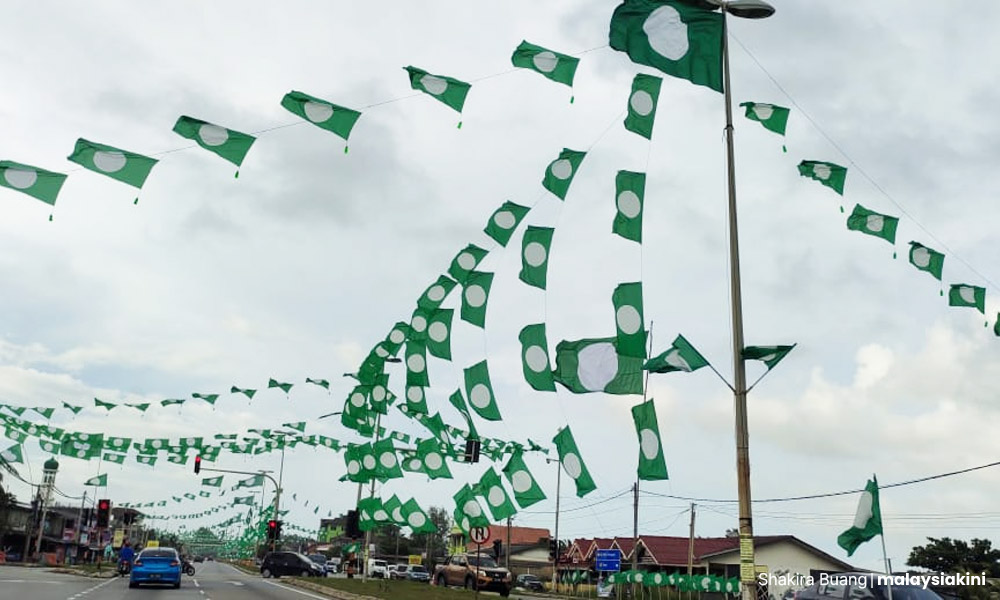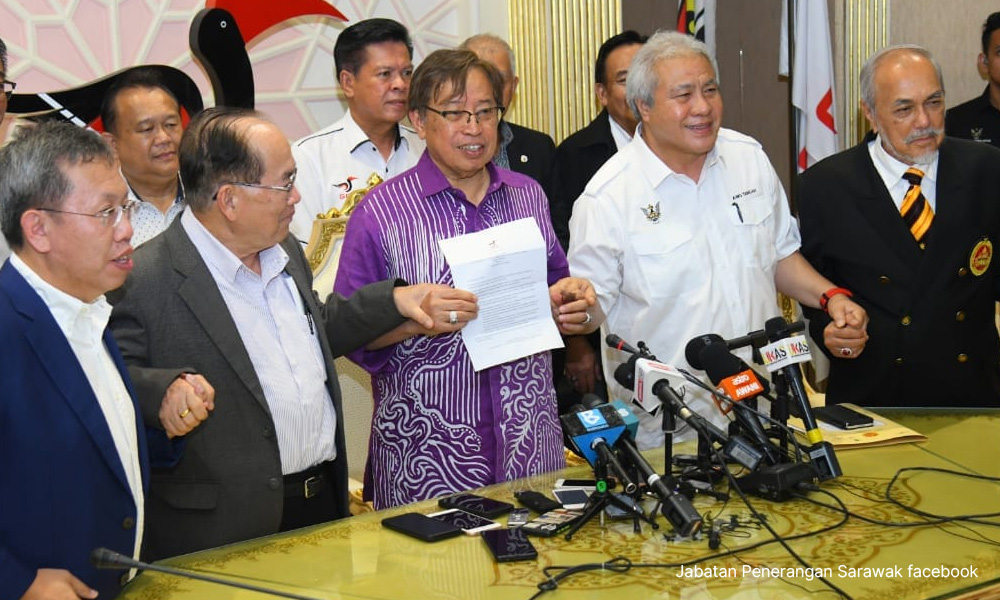Now that Umno decides to take the opposition bench, the ‘quickest’ but almost impossible option would be a Pakatan Harapan-Perikatan Nasional-Gabungan Parti Sarawak-Gabungan Rakyat Sabah grand coalition, and the more likely next option would be a PN-GPS-GRS minority government of 101 seats.
The survival of this minority coalition would hinge on GPS, the kingmaker with 22 seats, without whom, the next viable option would be a Harapan minority option of 82 seats.
If GPS can persuade PAS which has twice the number of seats, 44, to not march on its hardline Islamisation agenda - from gambling and alcohol ban to Hudud punishments, garnished by ‘anti-infidel’ statement from its top leaders every now and then - then this minority government may survive.
While PAS and GPS had already been coalition partners for 32 months since the Sheraton Move, then both were junior partners with 18 seats. Now, PAS is the largest partner, some wonder if the real prime minister might be Abdul Hadi Awang instead of Muhyiddin Yassin, and GPS holds the card that its withdrawal alone can bring down the government.
If the new GPS-PAS cohabitation works out successfully, PAS may mellow and replace Umno to become the largest Malay-Muslim party for several elections to come, and GPS may get to advance its Borneo agenda and loosen the ties between West and East Malaysia.
However, if the experiment fails, the new coalition may simply collapse at the next crisis, PAS would find its expansion rolled back within one term, and GPS may find itself in a colossal Dayak tsunami latest by 2026 which may install the first Dayak premier.
PAS’ ‘product differentiation’ game
Contrary to the perception of most liberals and non-Muslims, PAS is quite pragmatic and flexible on Islamisation, depending on political contexts and incentives. The hardline Islamisation - symbolised by Hudud - is both a core value and a cue of product differentiation.
PAS was in an existential crisis after losing state power in Kelantan to Umno in 1978 after six years of cohabitation. It had no government resources to sustain its base and its sheer existence was the antithesis of Malay unity.
By 1981, Hadi, then a young Turk clergy, articulated a powerful counter-narrative to Malay unity in his influential “Amanat Hadi”: “We reject [BN] because it preserves the Colonialist Constitution, the infidel laws and the pre-Islamic (jahiliyyah) rules”. Umno was labelled as an infidel for working with non-Muslims.

This radical vision of de-colonisation that aims to ‘restore’ Malaysia to an imagined syariah-based socio-political order kept PAS going in the wilderness in the 1980s, and bitterly split many families and villages along the partisan line.
When two waves of Umno schisms in the late-1980s and late-1990s opened up the door for PAS to vie for national power, it shrewdly grabbed the opportunity and teamed up with not only the Umno splinter - Tengku Razaleigh Hamzah’s S46 and Anwar Ibrahim’s PKR) but also DAP (albeit only indirectly in 1990-1995 through S46 which led both its Angkatan Perpaduan Ummah, APU and the multi-ethnic Gagasan Rakyat, GR). As part of Pakatan Rakyat (Pakatan), PAS even presented itself as “PAS for All”.
However, all three multi-ethnic opposition fronts – APU-GR, Barisan Alternatif (BA), Pakatan - eventually broke up. As PAS pursued the introduction of Hudud punishments (including amputation for theft, stoning for adultery and whipping for alcohol consumption) in Kelantan and land tax targeting non-Muslims and gender segregation in Terengganu, DAP cut ties to prevent its own electoral backlash.
Until MCA and Gerakan embraced PAS by way of respectively Muafakat Nasional (via Umno) and PN (direct membership), both parties constantly slammed DAP for selling out the non-Muslims by allying with and ‘mainstreaming’ PAS.
Notably, PAS’s Hudud pursuits in Kelantan (1992-3, 2014-5) and Terengganu (2003, after DAP left BA) happened after the opposition front lost the last election (1990, 1999 and 2013) and had no immediate prospect to win federal power in the next election.
This means hardline Islamisation may be simply a means of ‘product differentiation’ from Umno when PAS was weak.
This was partly confirmed by PAS deputy president Tuan Ibrahim Tuan Man’s candid answer in July 2020 on why PAS was not pursuing Hudud: “In the past, it's okay to demand from the government because we are not in government. But now, we are in government, if we demand, it means we are demanding from ourselves. If we scold, we are scolding ourselves.”
If PAS can keep this pragmatism for five years, GPS may not need to come to its DAP moment in breaking up the coalition government.
But PAS would be hard-pressed to deliver something on Islamisation - be it a gambling and alcohol ban, gender segregation, or restriction of Christian materials in Malay - to not lose its ‘product differentiation’ edge to Umno, Amanah and PKR, all with stronger ministerial talents.
Unless PAS can substitute its hardline appeal with something else like a technocratic or pro-poor credential, PAS hardcore supporters would feel cheated, as how some DAP hardcore felt after DAP became part of the federal government.
GPS’ ‘Sarawak Exceptionalism-Isolationalism’ defence
GPS chief and Sarawak Premier Abang Johari Openg clearly know of this danger.
His statement issued on Nov 20 listed the second purpose of supporting a PN+BN+GPS+GRS government as “upholding freedom of religion and diversity of customs and culture in Sarawak, as provided in the Federal Constitution, Malaysia Agreement 1963 and the Inter-Governmental Committee (IGC) Report”.
Abang Johari’s game of “Sarawak exceptionalism-Isoalationalism” is simply an upgrading of Taib Mahmud’s old playbook: “Support us as long as we can keep Umno out of Sarawak”, which was in turn based on a tacit agreement with Umno, “we deliver you the seats if you leave us alone”.
Developed by his uncle and Sarawak’s first Muslim chief minister Abdul Rahman Ya’kub, this ‘concurrent political contract’ with Sarawakian voters and Umno had allowed Taib Mahmud to dominate Sarawak like a one-party state.
Only interrupted briefly by a joint Dayak-Muslim political revolt in 1987-1991 led by Leo Moggie and Abdul Rahman, this statecraft made Taib a ‘necessary evil’ for many Sarawakians who tolerated his corruption because Umno’s Malay supremacy was simply worse.
This game only had its lasting crack in the 2006 election when national opposition parties made an unprecedented gain of seven seats - DAP (six) and PKR (one) - alongside two seats by local opposition, the strongest since 1991.
Since then, the electoral fortune of DAP and PKR had gone up and down corresponding to their national prospect. Local parties like Leo Moggie’s Parti Bansa Dayak Sarawak (PBDS) which was reabsorbed back into Sarawak BN by 1994, Abdul Rahman’s Permas, and PSB which overtook Harapan in the 2021 state election appeared only capable of producing only storms, but not yet a tsunami.
From GPS’ perspective, collaboration with national parties that contest in Sarawak is hurting its political monopoly. Hence, PN which contested only four seats and won one is certainly preferable to Harapan which contested almost all and won six.
And Lim Guan Eng’s arrogant comment as Harapan's finance minister that Sarawak would go bankrupt within three years under GPS provided a perfect excuse.
Abang Jo’s calculation is that he can extract enough concession on state rights on the MA63 front for Sarawakians to ignore any excesses by PAS.

This works well, especially with Sarawakians who want independence - “If Malaysia becomes more theocratic, more Sarawakians would support succession, as long as Sarawak can get out, who cares what PAS does over there?”
As compared to Taib, three things have changed in this Sarawak Exceptionalism-Isolationalism game for Abang Jo.
First, Abang Jo’s GPS has much more power over Hadi’s PAS than Taib’s Sarawak to Dr Mahathir Mohamad’s Umno. Sarawakians would expect GPS to do more than preserve Sarawak for two other reasons.
Secondly, more Sarawakians are settling in the peninsula and even the Muslims find PAS’ line of Islamisation suffocating. Third, unlike the dominant Umno which has a steady playbook, the surging PAS faces bottom-up pressure to deliver more on Islamisation.
Can Abang Jo manage Hadi?
It is perfectly understandable that East Malaysians - from elites to ordinary people - hate arrogant, ignorant and self-centric Malayans. Would “deputy prime minister” Hadi be easier to deal with than Guan Eng, who is at least no longer DAP’s boss? Alternatively, would Abang Jo be more successful than Anwar in dealing with Hadi?
If we eventually get a PN-GPS-GRS government, the outcome may not be as bad as many fear – either PAS becomes moderate because of GPS, or GPS faces a Dayak Tsunami because of PAS. Either might be enough for Malaysian democracy to find its right tempo as long as voters don’t give up. - Mkini
WONG CHIN HUAT is Deputy Head (Strategy), Asia Headquarters of the UN Sustainable Development Solutions Network (UN SDSN), at Sunway University. This Essex-trained political scientist works political institutions and group conflicts. Mindful of humans’ self-interest motivation while pursuing a better world, he is a principled opportunist.
The views expressed here are those of the author/contributor and do not necessarily represent the views of MMKtT.




No comments:
Post a Comment
Note: Only a member of this blog may post a comment.